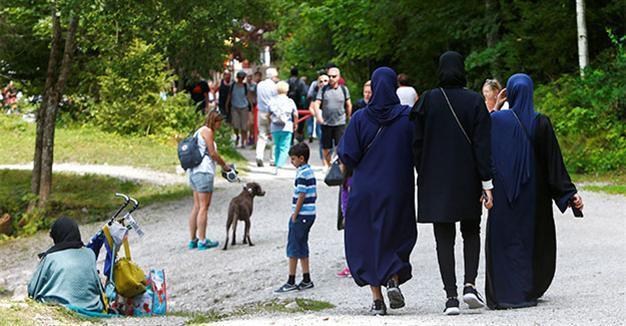German conservatives call for partial ban on face veil
BERLIN

Women wear burkas while visiting lake Eibsee near Garmisch-Partenkirchen, Germany August 16, 2016. REUTERS photo
German Chancellor Angela Merkel’s conservatives have agreed that women should be banned from wearing the face veil in schools and universities and while driving, Interior Minister Thomas de Maiziere said on Aug. 19.The move follows an influx last year of more than 1 million, mainly Muslim, refugees from Syria, Iraq and Afghanistan, and growing security fears among the public after two Islamist attacks and a shooting rampage by a mentally unstable teenager.
It also echoed a controversial move by several French towns in recent weeks to outlaw “burkinis,” the full-body Islamic swimsuit, at a highly sensitive time for relations with the Muslim community following a series of Islamist attacks.
Regional interior ministers belonging to Merkel’s Christian Democrats (CDU) and her Christian Social Union (CSU) allies presented a declaration in Berlin on tougher security measures, including more police and greater surveillance in public areas.
Among the more disputed proposals is a call for a partial ban on the burqa and niqab garments.
“We all reject the full veil - not only the burqa but also other types of full veil that only leave the eyes visible ... It has no place in our society,” Reuters quoted de Maiziere as telling reporters.
“Baring one’s face is essential for our communication, co-existence and social cohesion and that’s why we’re asking everyone to show their faces. We want to introduce a law to make people show their faces and that means that those who breach that law will have to feel the consequences.”
The conservative interior ministers want to ensure women show their face while driving, when they register with authorities, at passport controls and at demonstrations. They also want civil servants, teachers, students at schools and universities, judges and witnesses in court to be banned from wearing the full veil.
Merkel weighed in on the issue in comments to the RedaktionsNetzwerk Deutschland newspaper group published Aug. 18. She was quoted as saying: “From my point of view, a fully veiled woman in Germany has barely any chance of integrating.”
De Maiziere said that the regional interior ministers’ declaration sent a signal that the full veil was not wanted in Germany, although it was not possible to fully ban everything that was undesirable.
The CDU proposals must be adopted by the government before they can become law. The debate over a ban on the face veil has divided Merkel’s ruling coalition; her Social Democrat (SPD) junior coalition partners largely oppose the demands.
The CDU’s calls for a partial ban come as it has lost support to the anti-immigrant Alternative for Germany (AfD) party, which says Islam is incompatible with the constitution and wants to ban the burqa and minarets on mosques. The AfD is expected to perform well in regional elections in Berlin and the eastern state of Mecklenburg-Vorpommern in September.
SPD Labour Minister Andrea Nahles has said the calls were a sign of an “increasingly xenophobic” political discourse in Germany and could be a serious setback to efforts to integrate immigrants.
Justice Minister Heiko Mass, also from the SPD, said debates about the burqa and security should be kept separate.
Germany has nearly four million Muslims, about five percent of the total population.
There are no official statistics on the number of women wearing a burqa - which covers the face and body - in Germany but Aiman Mazyek, leader of its Central Council of Muslims, has said hardly any women wear it.
A study carried out by the Federal Office for Migration and Refugees in 2009 found that more than two-thirds of Muslim women in Germany did not even wear a headscarf. The niqab covers the hair and face except for the eyes.
















